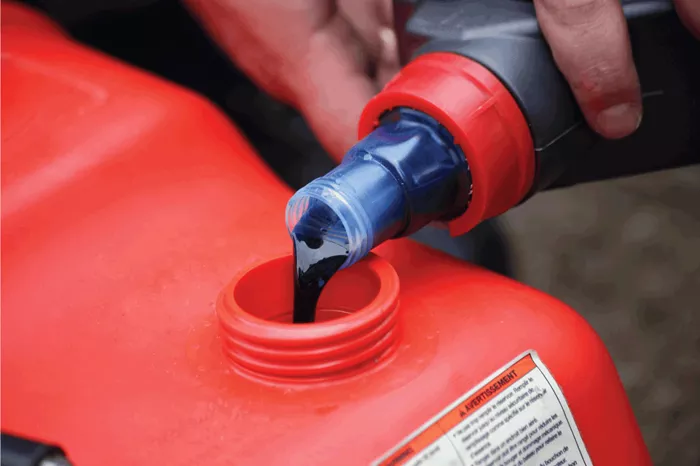Maintaining a 4-stroke lawn mower requires not only regular cleaning and air filter replacements but also choosing the right oil to ensure peak performance and longevity. The type of oil used is crucial for the engine’s efficiency, protection, and overall lifespan. Here’s a guide to understanding what oil your 4-stroke lawn mower needs, including the best types of oils, maintenance tips, and manufacturer recommendations.
Recommended Oil Types for 4-Stroke Lawn Mowers
SAE 30 Oil
SAE 30 is one of the most commonly recommended oils for 4-stroke lawn mowers, especially for use in warmer temperatures. This single-grade oil provides excellent lubrication under typical operating conditions and is ideal for hot weather when your mower is under heavy use. SAE 30 oil is designed to maintain its viscosity at higher temperatures, which helps protect the engine from excessive wear.
10W-30 Oil
For those who live in regions with fluctuating temperatures, 10W-30 oil is a great all-season alternative. The “10W” indicates that the oil remains thin enough to flow freely in colder weather, ensuring good start-up protection. The “30” means the oil performs similarly to SAE 30 when the engine reaches operating temperature, offering stability at higher temperatures. This versatility makes 10W-30 a popular choice for homeowners who use their lawn mower year-round or live in areas with varying climates.
Synthetic Oils
While conventional oils like SAE 30 and 10W-30 are often sufficient, synthetic oils offer superior performance. Synthetic oils are engineered for higher efficiency and provide better protection under extreme conditions. They are more resistant to breakdown at high temperatures and have improved cold-start properties. Using synthetic oil can help extend the engine life, improve fuel efficiency, and enhance overall performance, especially if your mower is subjected to harsh weather or heavy-duty use.
Manufacturer Recommendations
Consult the Owner’s Manual
Before selecting oil for your lawn mower, always consult the owner’s manual. The manufacturer’s instructions will provide specific recommendations based on the make and model of your mower. Each engine has its own unique requirements, and using the recommended oil type ensures optimal performance. Ignoring these guidelines could lead to engine damage, reduced efficiency, or even void the warranty.
Oil Change Frequency
Regular Maintenance
To keep your mower running smoothly, it’s essential to change the oil regularly. Typically, oil should be changed every 25-50 hours of use or at least once a season, depending on the frequency of mowing and the conditions in which the mower operates. Fresh oil ensures that the engine remains lubricated, clean, and protected from internal friction.
Oil Check Tips
It’s important to check the oil level and quality regularly. Low or dirty oil can cause the engine to overheat, leading to unnecessary wear and potential damage. Always make sure the oil is at the recommended level and is free from debris or contaminants. If the oil looks dark, gritty, or smells burnt, it’s time for a change.
Benefits of Using the Right Oil
Engine Protection
The right oil helps prevent engine wear by providing a thin, protective layer between metal components, reducing friction. Over time, friction can lead to engine degradation, so choosing the correct oil type plays a key role in preserving the engine’s condition.
Performance
When the right oil is used, the engine can run more efficiently, which enhances the mower’s overall performance. This means smoother operation, faster starts, and less vibration, making your mowing tasks easier and more enjoyable.
Longevity
Using the correct oil contributes to the longevity of your mower by protecting key components and preventing the build-up of sludge or carbon deposits. An engine that’s properly maintained with the right oil will last longer and require fewer repairs.
Seasonal Considerations
Temperature Variations
Different oils perform differently depending on the temperature. In warmer weather, thicker oils like SAE 30 may be ideal, as they maintain their viscosity and offer sufficient lubrication. Conversely, in colder climates, oils like 10W-30 ensure that the engine starts easily and runs smoothly during chilly mornings.
Choosing the Right Oil for the Season
For areas with cold winters, it’s best to switch to a lower-viscosity oil, such as 5W-30 or 10W-30, to ensure optimal start-up performance. In hotter climates or for heavy-duty usage, a single-grade oil like SAE 30 may be the most appropriate choice. Always consider the temperature range when selecting oil to ensure your mower operates efficiently.
Oil Brands and Quality
High-Quality Oil Brands
When purchasing oil for your 4-stroke lawn mower, opt for high-quality, reputable brands. Leading names in the industry include:
Briggs & Stratton: Known for producing oils specifically designed for small engines like lawn mowers.
Honda: Offers oils that meet the rigorous demands of their engine specifications.
Mobil 1: Provides synthetic oils with superior performance, especially for high-demand conditions.
Certification Standards
Always look for oils that meet API (American Petroleum Institute) certification standards. These oils have undergone rigorous testing and meet specific quality and performance criteria. Choosing certified oils ensures that you’re using a product that is safe and effective for your lawn mower.
Conclusion
The right oil is essential for maintaining the health and performance of your 4-stroke lawn mower. Whether you opt for SAE 30, 10W-30, or a synthetic option, it’s crucial to choose oil that matches your mower’s needs and the environmental conditions in which it operates. Regular oil checks and timely changes will protect the engine from wear, optimize performance, and extend the life of your lawn mower, ensuring it remains in top shape for years of mowing.
Related topics:
- What Oil to Use for Troy-Bilt Lawn Mower: A Comprehensive Guide
- What Type of Oil Do Push Lawn Mowers Take?
- What Type of Oil for My Lawn Mower? A Comprehensive Guide

